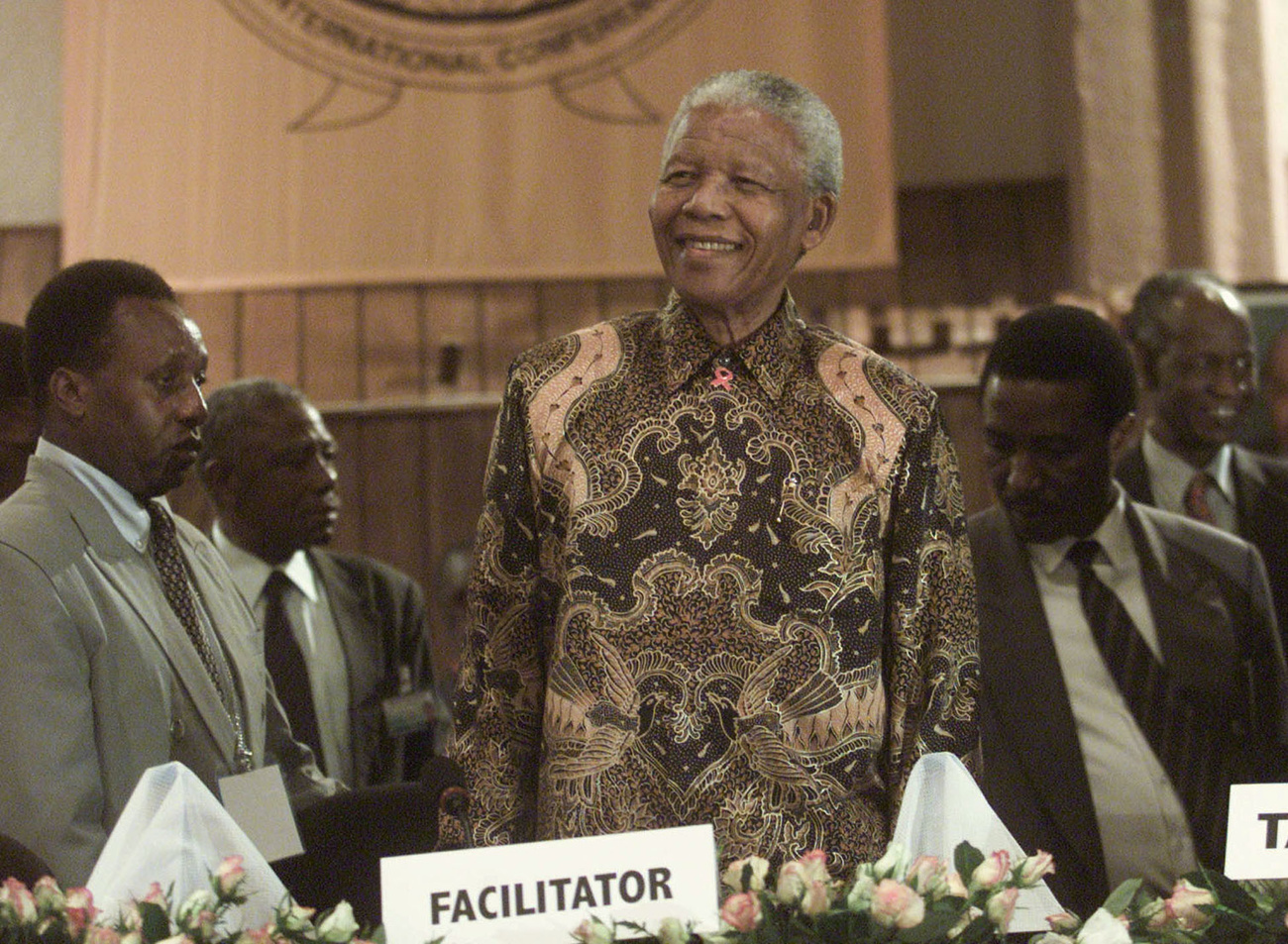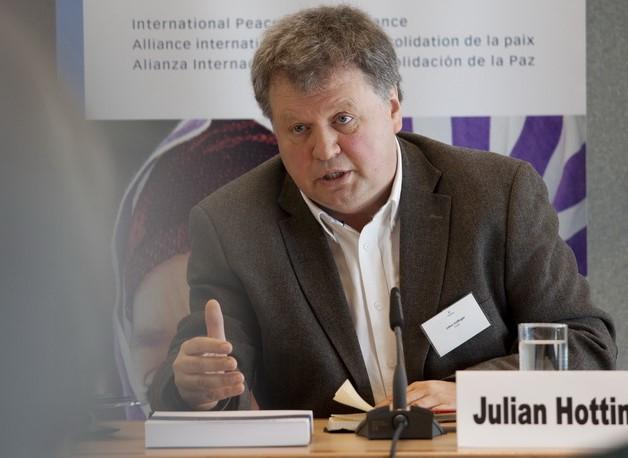
‘Negotiating with the Devil’: What it takes to be a peace mediator

Mediating peace is, by necessity, a discreet job. Mediators, especially NGOs, don’t talk much about what happens behind the scenes or the moral dilemmas they may have to face. They are an important part of Swiss diplomacy and will ultimately play a role in reaching peace in Ukraine.
“When you have a conflict, there is immediately a tendency to dehumanise the other side,” Pierre Hazan, senior advisor with the Geneva-based Centre for Humanitarian Dialogue (HD Centre) tells SWI swissinfo.ch when asked about the title of his bookExternal link published in September, Negotiating with the Devil. “And very often we are talking about people who committed war crimes. And so the question is, do you want basically to limit the extent of regional and international insecurity? Do you want to stabilise the situation, help find some kind of settlement? You need to negotiate and you don’t do it with the good guys.”
These people have their own interests and may not be serious about peace, he says. They may want to manipulate you.
Ethical dilemmas
And, in his experience, there are other moral dilemmas. If you help broker safe evacuation of civilians to save them from harm, in Syria for example, it might be contributing to the ethnic cleansing goals of warring parties. If you are charged with selecting a third of prisoners for release from a terrible camp held by Croatian militia in Bosnia, how do you choose?
Hazan was with a team of humanitarian workers who had to do just that near Mostar in 1993. He describes the appalling conditions, the weight loss of the prisoners and the knowledge that those left behind could die, as well as the cynical approach of the camp officer who only wanted to release those of “no value” (for example, without relatives in Germany, Austria or Switzerland who might pay a ransom). No agreement was reached, and the officer suddenly refused all releases. The buses sent to collect the released detainees left empty.
Hazan says this was a moral turning point for him. “Over those few days,” he writes, “I realised how this ethical responsibility, which seeks to adjust the means to the goal, can be a heavy burden, with all the potentially fatal consequences that can result.”
The definition of peace mediation is vast. “It’s basically when a third party intervenes in order to bring some type of resolution to the conflict, or to mitigate the consequences of a conflict on the population,” he says. For example, Norway and Cuba helped broker the 2016 peace deal in Colombia between the government and FARC rebels. In the Central African Republic during the pandemic, HD Centre helped broker access to civilians in regions held by armed groups so that people could be vaccinated.
Specifically Swiss
Simon Mason, who heads the mediation support team at the Center for Security StudiesExternal link at the federal technology institute ETH Zurich, says peace mediation is something of a Swiss speciality, although other countries like Norway and Finland also have peace promotion as part of their foreign policy.
He points out that Switzerland includes in its constitutionExternal link the aim of contributing to “the peaceful co-existence of peoples as well as the conservation of natural resources” (Article 54). There are different reasons for this, he continues, including its humanitarian tradition (linked to the International Committee of the Red Cross (ICRC)) and as “part of global burden sharing, where Switzerland is weak in military peacekeeping so does more in civilian peace promotion”.
Swiss NGOs working in peace mediation include HD Centre and Interpeace, both based in Geneva like the ICRC, which also talks to all parties in conflict zones, negotiating access to relieve the suffering of civilians.
Geneva Call, which works with armed groups to promote respect for humanitarian norms and principles, is not strictly a mediator but, as its director Alain Délétroz told SWI swissinfo.ch in a 2020 interview, armed groups can sometimes end up being prepared to sit at the negotiating table and “when we reach that stage, Geneva Call has the duty to humbly get out of the way and put them in touch with official diplomacy or other partners like the HD Centre which has the capacity and the professionalism to set up a calendar of political negotiations”.
Asked for an overview of Swiss conflict mediators, Mason says it depends on whether you follow a broad or narrow definition. If you include mediation support and peace promotion, there are also more research-focused organisations like CSS and swisspeaceExternal link (CSS also provides training for mediators, and swisspeace provided support, for example, to a Syrian civil society peace initiative in Geneva). The Geneva Centre for Security Policy (GCSP)External link provides a space for dialogue on peacebuilding issues, while the PeacenexusExternal link foundation and the Cordoba Peace InstituteExternal link provide support to peacebuilding capacities in various parts of the world. Most of them are in Geneva, but CSS is in Zurich and swisspeace in Basel.
There are different specialisations and focus areas. Govinda Clayton, a senior researcher in peace processes also working at CSS, likes to call it an “ecosystem”.
There are different levels of mediation.
Track One processes involve the top leadership of the conflict parties engaging with each other. This often involves government officials and representatives of inter-governmental organisations, Govinda Clayton, a senior researcher in peace processes working at CSS explains. “An example would be where a United States or United Nations official leads a process between the conflict parties’ leadership.” US Ambassador Richard Holbrooke, for instance, is credited with brokering the Dayton accord that ended the Bosnian war in the 1990s. Jimmy Carter brokered the 1978 Camp David Accords for Middle East peace between the leaders of Egypt and Israel.
Track Two is a less formal process, Clayton continues, between members of conflicting groups that aims to assist official leaders to resolve or manage conflicts by exploring possible solutions in a less official or public setting. “It’s not official, often doesn’t involve the conflict parties, or at least not the leaders, but involves, for example, influential business leaders, civil society, religious leaders and academics.”
Track Three is “very much local level processes”, often led by grassroots NGOs, he says. Interpeace is a good example of a Swiss NGO working mainly at this level of mediation. Born out of the UN, it became an independent organisation some 20 years ago and works with local NGOs on the ground now mostly in Africa and the Middle East.
While Track One processes are important, they are only part of the picture and many peace accords fail, says Interpeace Senior Director of Programmes Renée Larivière. “If people have been at odds and fighting each other for many years, experiencing violence and trauma, we found that signing a peace agreement, a piece of paper, would not necessarily bring peace overnight,” she told SWI swissinfo.ch.
Interpeace for example aims to adapt to local contexts and be “invested in the long-term and the accompaniment process, trying to figure out how we’re going to get societies or individuals to start living together again”, says Interpeace Senior Director of Programmes Renée Larivière.
She gives the example of an Interpeace programme in Kenya, where it has been working with the National Cohesion and Integration Commission monitoring a ceasefire agreement in the Mandera Triangle, which borders Ethiopia and Somalia. This region has a long history of violent conflict between clans and different communities. Through setting up local ceasefire monitoring committees and local mediators, the peace has continued to hold, and inter-clan relations have improved, she says.
NGOs may play a role, in one way or another, at all stages of a peace process. “NGOs are fast and flexible, but often lack the leverage or democratic legitimacy needed for sustained mediation efforts in challenging political conflicts,” said a 2011 CSS Mapping MediatorsExternal link report co-authored by Mason. “Their key advantage seems to be in the pre-negotiation phase, or in support of negotiations and implementation.”
Mediating peace in Ukraine
The biggest conflict on everyone’s minds right now is Ukraine, and there is no sign yet that either Moscow or Kyiv are ready to come to the negotiating table. Yet mediators have already been working behind the scenes to try to alleviate the humanitarian consequences. Turkey and Saudi Arabia facilitated a prisoner swap involving foreign nationals. HD Centre reportedly played a role in the Black Sea Grain dealExternal link, allowing deliveries of Ukrainian grain to reach needy countries, notably in Africa.
Clayton of CSS co-authored a recent report on why conflict parties cease fightingExternal link. It is based on an analysis of more than 2,000 ceasefire agreements around the world from 1989 to 2020. It focuses on internal conflicts, prevalent during this period, but Clayton thinks it might also hold some pointers for the Ukraine-Russia war.
One of the main findings of this research, he argues, is that ceasefires are inherently political arrangements, meaning agreements to stop violence depend on progress in negotiations of the main issues. He also found that when parties were not able to agree a ceasefire in the early phases of a conflict, it sadly often took years to come to an arrangement.
In Ukraine there was a network of trained local mediators in place even before the start of the war on February 24 this year, says Larivière of Interpeace, and they have been working particularly to facilitate the integration of internally displaced people, including Russian speakers, into communities.
“The work that they’re doing locally is vital in ensuring that there’s a strong social fabric, social cohesion and resilience of communities,” she told SWI swissinfo.ch, “because what we’ve seen often is that after the war stops, if the ground is not prepared or if the ground doesn’t have a network of people who can help mediate, there will be flare-ups”.
Although peace in Ukraine appears a long way off, it seems there are already some efforts behind the scenes to prepare the ground.

More
‘We are constantly surrounded by people yet always alone’

In compliance with the JTI standards
More: SWI swissinfo.ch certified by the Journalism Trust Initiative





























You can find an overview of ongoing debates with our journalists here . Please join us!
If you want to start a conversation about a topic raised in this article or want to report factual errors, email us at english@swissinfo.ch.